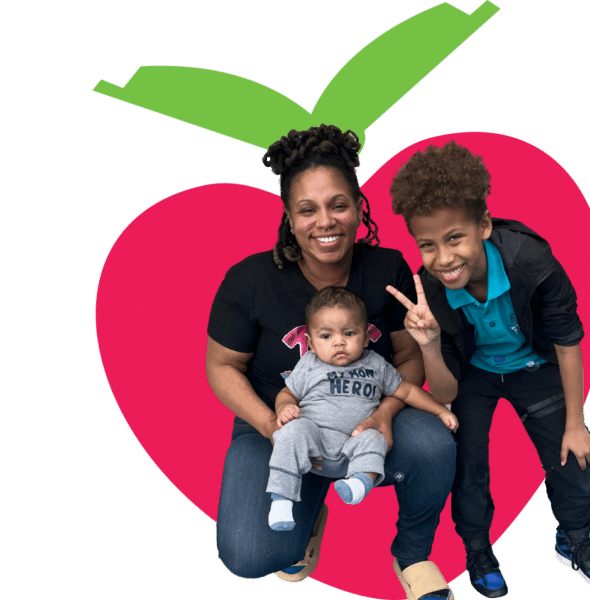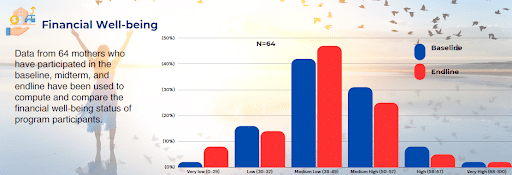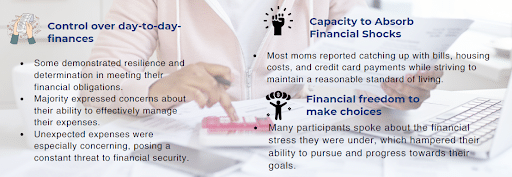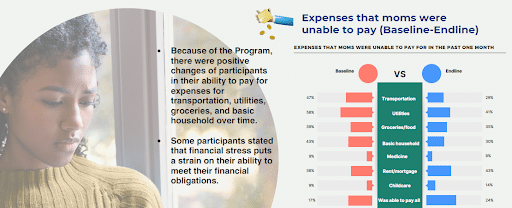
Thursday, June 13, 2024 at 1:00 PM

Thursday, June 13, 2024 at 1:00 PM
In today’s society, financial stability is a fundamental pillar of well-being, yet many individuals, particularly new and expecting mothers, face significant barriers to achieving this stability. In 2022, in collaboration with the D.C. Office of the Deputy Mayor for Planning and Economic Development (DMPED), Martha’s Table launched The Strong Families; Strong Futures (SFSF) program, a program that supports new and expecting mothers residing in DC Wards 5, 7, and 8 during the critical first year of their child’s life.
In November 2023, using a blend of quantitative and qualitative methods, we evaluated the program to understand the circumstances encountered by new and expecting mothers. This laid a foundation for tracking the program’s impact on their well-being over time. Below is a high-level summary of the findings.
The SFSF direct cash assistance has improved participants’ financial stability and provided them access to the critical resources they need. The gratitude expressed by participants for this financial assistance is a testament to its positive impact on their overall financial well-being status. Some participants’ quality of life has significantly improved because of the program’s comprehensive approach to providing them with the ability to obtain the essential services and resources they need in their lives.

Looking at the comparisons between the baseline and end-line findings in the face of other financially impeding factors throughout the two periods, the Strong Families; Strong Futures program has positively impacted the financial well-being of new and expecting mothers. In the absence of this program’s assistance, these mothers would have been more vulnerable to financial difficulties due to the occurrence of other compounding socioeconomic factors.

Mothers also emphasized the importance of having the financial resources and stability to afford the things they desired, as well as the freedom the program has given them to make decisions that aligned with their goals. A mom said, “I want to be able to pursue my dreams without being constrained by financial limitations.”
The program has seen a notable improvement in the ability of program participants to cover all expenses, with the percentage of participants able to do so increasing from 17% to 24%.
 “We find creative solutions, adapting and making the most of what we have, whether exploring side hustles or becoming resourceful in saving money.” Comparing the results of the baseline and endline demonstrate positive financial changes in the lives of mothers; however, between the midline and endline assessment regression occurred because mothers that selected the lump sum payment had run out of funds by that point and struggled to sustain the momentum generated in the first 6 months of the program.
“We find creative solutions, adapting and making the most of what we have, whether exploring side hustles or becoming resourceful in saving money.” Comparing the results of the baseline and endline demonstrate positive financial changes in the lives of mothers; however, between the midline and endline assessment regression occurred because mothers that selected the lump sum payment had run out of funds by that point and struggled to sustain the momentum generated in the first 6 months of the program.
Most respondents (74%) preferred receiving their cash payments as a lump sum instead of a monthly payment option. This preference was primarily driven by concerns about losing other benefits (55%) and having immediate financial needs (60%). A smaller portion of respondents (31%) expressed concern about future money availability. To eliminate concerns about loss of TANF or SNAP benefits, DC Council amended eligibility so that money received through a DC Government funded cash transfer program will not be counted as income. The amendment of SNAP and TANF eligibility was a driving force towards removing the lump sum as a payment option for year II. In year II mothers will receive cash in a monthly payment.
An additional learning from the year I program evaluation driving change for year II is that Martha’s Table has an opportunity to enhance the financial empowerment interventions. Martha’s Table will continue working with the Department of Insurance Securities and Banking and Capital Area Asset Builders to introduce new financial empowerment workshop topics and offer individualized support designed to enhance capacity and skills conducive to financial sustainability.
Martha’s Table is encouraged by the results of the pilot program and the impact that it has on the lives of mothers served; however, it recognizes that one year of financial support will not move individuals from the state of chronic instability. Underlying systemic issues contribute significantly to participants’ financial insecurity, but multi-year cash transfer programming has the ability to gradually offset the impacts of poverty and create a pathway to economic mobility.
To expand and sustain publicly funded cash transfer programs in Washington, DC legislation is needed to create a yearly budgetary allocation to underpin this important work. Martha’s Table is continuing efforts to uplift the impact of cash transfer programs on the lives of families with the ultimate goal of generating support needed to achieve legislation implementation. We can’t do this alone and encourage stakeholders to express support via council members and other public officials that have the power to make the desired change. Martha’s Table is honored to be a champion for cash transfer programming and is devoted to continuing this life changing programming. We are committed to leveraging our resources and identifying potential funding partners to continue to deliver on Martha’s Table’s mission to support strong children, strong families and strong communities.
 News
NewsDecember 11, 2025 at 10:17 AM
Martha’s Outfitters is more than a no-cost community clothing boutique. It is a place where DC neighbors come together, whether they are picking out a professional outfit, shopping for children’s clothes, or lending a hand to help others. At the heart of it all are our volunteers, who keep the boutique running smoothly and welcoming for everyone.
December 5, 2025 at 5:27 PM
We are thrilled to celebrate Tiffany Williams, named the Washington Business Journal’s Nonprofit Leader of the Year! From guiding high-impact programs to inspiring a team that serves over 45,000 residents each year, Tiffany’s leadership reflects vision, heart, and a deep belief in the strengths of our community.
November 25, 2025 at 1:18 PM
From joyful conversations to plates stacked high with Thanksgiving favorites, our Community Harvest Dinner was a beautiful reminder of what it means to show up for one another.
 Connected
Connected
0 New comments